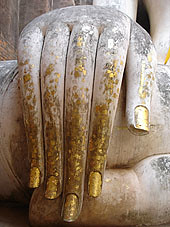 Hubble photo:Nasa
Hubble photo:Nasa[Once upon a time] there lived [a man called] Svetaketu Aruneya. To him his father said: "Svetaketu, you should [now] live the life of a chaste student of sacred knowledge. No one in our family, my dear boy, is uneducated, a [mere] hanger on, as you might say, of the Brahman class."
So at the age of twelve he went to [a master], and when, at the age of twenty-four, he had studied all the Vedas, he returned, conceited, priding himself on his learning, and obdurate.
Then his father said to him: "Svetaketu, my boy, since you are now conceited and obdurate, and pride yourself on your learning, did you also ask about that teaching by which had [hitherto] not been heard, is heard; what had [hitherto] not been known, is known?"
"Now, sir, what manner of teaching is that?"
"My dear boy, just as all that is made up of clay can be known by one lump of clay- its modifications are verbilizations, [mere] names- the reality is just 'clay-ness.'
"And dear boy, just as all that is made of copper can be known by one copper ornament-its modifications are veribilizations, [mere] names-the reality is just copper.......- so dear boy, is that teaching."
"Now, I am sure those venerable gentleman did not know this; for it they had known it why should they not have told me? Do you, sir, then, tell me."
"My dear boy, I will", said he.....
"As bees, dear boy, make honey by collecting the juices of many trees and reduce the juice to a unity, yet [those juices] cannot percieve any distinction there [so that any of them might know;] 'I am the juice of this tree', or "I am the juice of that tree', [so too], my dearest boy all these creatures [here], once they have merged into Being do not know that they have merged into Being.
"Whatever they are in this world, whether tiger or lion, wolf or boar, worm or moth, gnat or fly, that they become again.
"This finest essence- the whole universe has it as its Self: That is the Real: That is the Self: That
you are, Svetaketu!"
"Good, sir, will you kindly instruct me further?"
"I will, my dear child" said he.
"[Look at] this great tree, my dear. If you were to strike at its root, it would bleed but live on; if you were to strike it in the middle, it would bleed but live on; if you were to strike it at the top, it would bleed but live on. Strengthened by the living Self, it still stands, drinking in the moisture and exulting.
"If life leaves one of its branches, it dries up; if it leaves a second, that too dries up; if it leaves a third, that too dries up. If it leaves the whole [tree], the whole [tree] dries up. This, my dear boy, is how you ought to understand it," said he.
"When the life has gone out of it, this [body] dies; [but] the life does not die.
"The finest essence - the whole universe has it as its Self: That is the Real: That is the Self: That
you are, Svetaketu!"
"Good sir, will you kindly instruct me further?"
"I will, my dear child," said he.
"Just as a bird, tied to a string, will fly around in all directions and finding no resting-place anywhere else, will resort to the very [string] that keeps it captive, so too, my dear, the mind will fly around in all directions and, finding no resting-place anywhere else, will come to rest in the breath of life; for, my child, the mind is the captive of the breath of life."
"Bring me a fig from other there."
"Here you are, sir."
"Cut it open."
"[There it is,] cut open, sir."
"What do you see there?"
"These rather small seeds, sir."
"Would you, please, cut one of them up?"
"[Here is one,] cut up, sir."
"What do you see there?"
"Nothing at all, sir."
Then he said to him: "My dear boy, it is true that you cannot perceive this finest essence, but it is equally true that this huge fig tree grows up from this same finest essence.
"My dear child, have faith.
"This finest essence- the whole universe has it as its Self: That is the Real: That is the Self: That
you are Svetaketu!"
"Good sir, will you kindly instruct me further?"
"I will, my dear child," said he.
---------------------
Upanisad taken from:Heehs, Peter Indian Religions: A Historical Reader of Spiritual Expression and Experience New York: New York University Press, 2002Philosophy,Religion,Hindu,Mind,Consciousness,,Weblog,Blog Philosophy,Religion,Hindu,Mind,Consciousness,Weblog,Blog
Philosophy,Religion,Hindu,Mind,Consciousness,Weblog,Blog

 Philosophy,Religion,Taoism,Mind,Consciousness,Weblog,Blog
Philosophy,Religion,Taoism,Mind,Consciousness,Weblog,Blog

 Philosophy,Religion,Taoism,Mind,Consciousness,Weblog,Blog
Philosophy,Religion,Taoism,Mind,Consciousness,Weblog,Blog
 Philosophy,Religion,Hindu,Mind,Consciousness,Weblog,Blog
Philosophy,Religion,Hindu,Mind,Consciousness,Weblog,Blog






